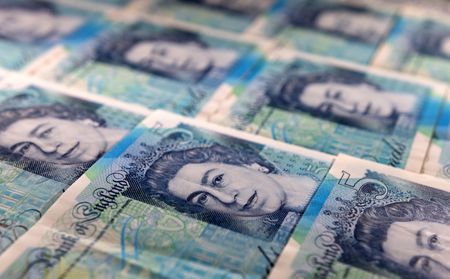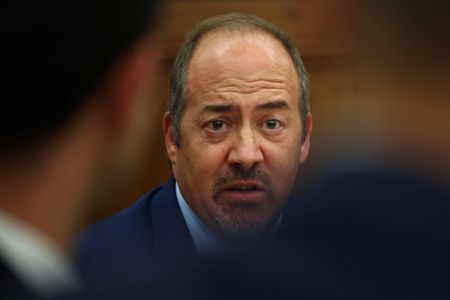By Stefano Rebaudo
(Reuters) -The pound hit a fresh five-month low versus the euro on Monday, even as it rose against a weakening dollar, as recent economic data and comments from a Bank of England official led investors to increase their bets on future BoE rate cuts.
Last week, data showed British retail sales fell by 0.3% in December while analysts expected a rise, core measures of consumer price growth fell sharply, and rate setter Alan Taylor said he expected the BoE to cut rates four times in 2025.
Markets are currently pricing 62 basis points of rate cuts in 2025 from around 40 bps before the inflation data.
Concerns about the UK’s fiscal outlook put pressure on the British pound and bond prices two weeks ago.
However, after recent data, investors shifted their focus back to the so-called monetary policy divergence from the Bank of England and other major central banks.
The pound fell 0.3% against the dollar to $1.2197, not far from the 14-month low it touched on Monday.
The U.S. dollar dropped on Monday before Donald Trump’s inauguration as U.S. president later in the session, with investors focusing on policy announcements that could immediately affect the greenback.
“Inflation coming in lower than expected in December and a generally weaker tone in the latest economic releases has revived the prospect of Bank of England cuts, which, of course, is not helping the pound,” said Enrique Diaz Alvarez, chief financial risk officer at Ebury.
“This week’s labour report and PMI data are key, particularly the latter,” he added.
Investors will focus on November’s wage numbers, due on Tuesday, and any evidence of a more sustained acceleration.
Meanwhile, they expect further moderation from the Friday Purchasing Managers’ Index data for January on Friday and the GfK consumer confidence indicators.
The euro rose 0.36% to 84.71 pence per euro, after hitting 84.73, its highest level since Aug.
26.
“Recent softer inflation data has tempered stagflation fears while accelerating expectations for BoE rate cuts,” said George Vessey, lead forex strategist at Convera, after mentioning fiscal challenges which weakened the pound recently.
Analysts will closely watch fiscal developments after a rise in borrowing costs since the budget has put the government at risk of missing self-imposed targets to balance day-to-day spending.
“The solution to the current challenges is sterling-negative,” said Chris Turner, head of forex strategy at ING.
“To resolve the risk of breaching the fiscal rule, either the government needs to cut spending, the Bank of England to cut rates – lowering Gilt yields – or both,” he added.
(Reporting by Stefano Rebaudo; Editing by Hugh Lawson)










